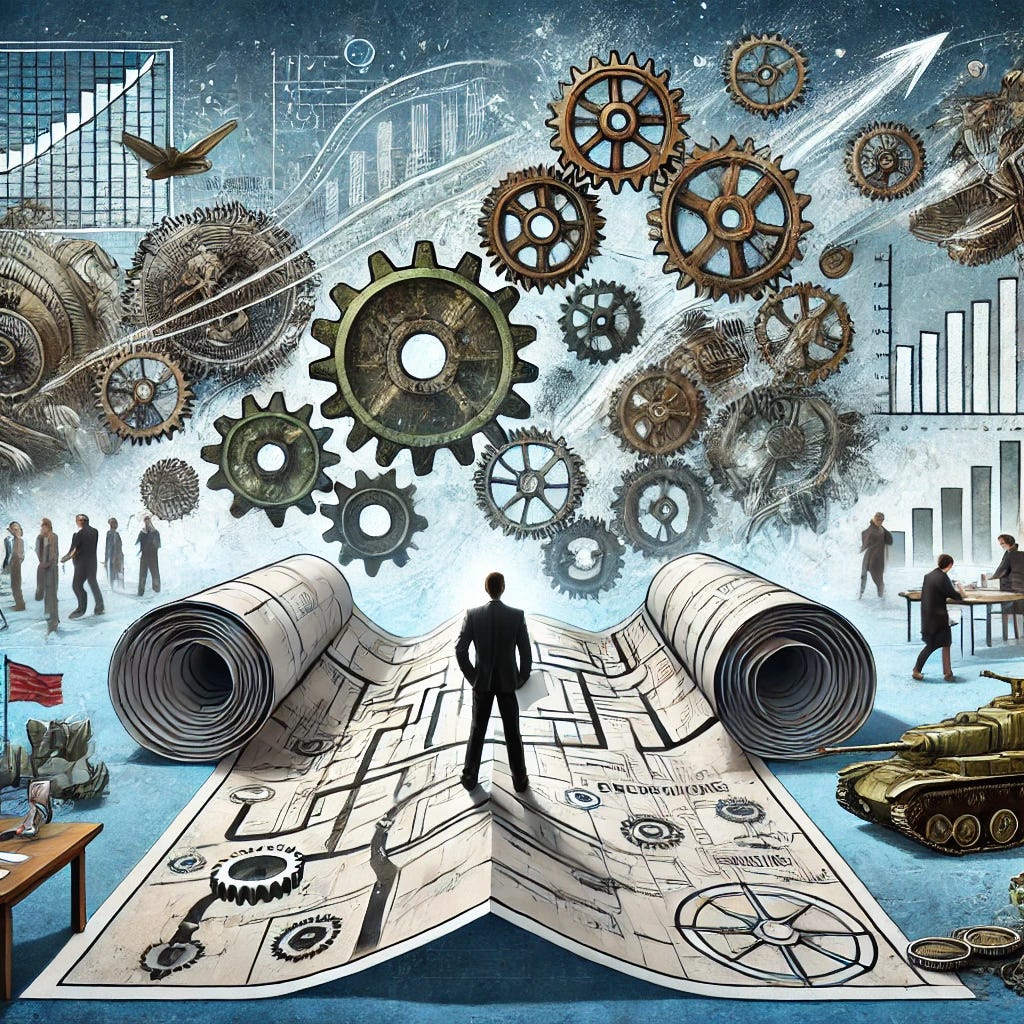"Plans are nothing; planning is everything." – Dwight D. Eisenhower
There’s a reason this quote has stood the test of time. Eisenhower, a man who commanded one of the most complex military operations in history, understood something that most people still get wrong today: A plan is a static document, but planning is a dynamic process.
It’s easy to believe that successful planning is about crafting the perfect blueprint. But how many plans survive first contact with reality? Almost none. As Mike Tyson famously said, "Everyone has a plan until they are punched in the face." What separates those who thrive from those who crumble isn’t the quality of their plan—it’s their ability to adapt when the plan inevitably falls apart because of the work that went into creating the plan. Head hurt? Mine too.
The Illusion of the Perfect Plan
Humans love certainty. We crave control. A well-laid plan gives us the illusion of both. We map out every detail, anticipate every challenge, and convince ourselves that if we follow the steps, success is guaranteed.
But then reality happens.
A competitor releases a new product before you do.
A key team member quits unexpectedly.
A global event flips your industry upside down overnight.
Suddenly, that perfect plan is worthless. As the old saying goes, "If you want to make God chuckle, tell him your plans." But the act of planning—the process of thinking through variables, assessing risks, and preparing contingencies—is what gives you the ability to pivot.
Why Planning Is More Valuable Than Any Single Plan
1. Planning Develops Decision-Making Muscles
Plans are a snapshot in time. But planning is an ongoing exercise in critical thinking, forcing you to ask the right questions:
What are the biggest risks?
What resources do we have?
Where are we vulnerable?
By engaging in planning rather than just writing plans, you train your mind (and your team) to make quick, informed decisions when circumstances shift.
2. Planning Prepares You for Uncertainty
The most successful people and organizations aren’t the ones with flawless plans—they’re the ones who expect change and prepare accordingly. Consider the military. No battle plan survives first contact with the enemy, but rigorous training and scenario planning ensure that soldiers can adapt in real-time.
The same applies to business, leadership, and even personal life. If you rigidly cling to a plan, you’re setting yourself up for failure. If you embrace planning as an iterative process, you’re ready for whatever comes next.
3. Planning Prevents Decision Paralysis
Ever seen someone freeze under pressure? It happens when they’ve relied too heavily on a fixed plan and suddenly face an unexpected challenge. Without a script, they’re lost.
But those who engage in continuous planning don’t panic. They’ve already considered alternatives. They’ve already thought through contingencies. Instead of freezing, they adapt and execute.
A Real-World Example: When the Plan Failed, but Planning Saved the Day
In 2010, a major tech company was preparing to launch a flagship product. The plan was set: the marketing campaign was in place, production was aligned, and distribution was mapped out. Everything seemed perfect.
Then, just weeks before launch, a critical supplier went bankrupt, leaving the company scrambling for a key component. The entire launch would have collapsed if they relied solely on their plan. However, because their planning process included risk assessments and contingency options, they quickly pivoted to an alternative supplier, adjusted their timeline, and executed a revised strategy. The launch was delayed by only a week, and the product still became a major success.
This wasn’t because the plan was perfect—it was because the team had built adaptability into their process.
Examples of Planning Over Plans in Action
1. Eisenhower and D-Day
When Eisenhower led the Allied invasion of Normandy, the plan was detailed beyond belief. But the moment troops landed, things went wrong:
Weather conditions disrupted the timing.
Enemy defenses were stronger than expected.
Units got scattered and lost communication.
If success depended on the plan going perfectly, the operation would have failed. Instead, it succeeded because of the planning process—leaders at every level knew how to adjust to the chaos in real time.
2. Entrepreneurs Who Pivot
Consider Airbnb. Originally, the founders planned to rent out air mattresses in their apartment to conference attendees. That idea was small and unsustainable. But through constant planning, testing, and adjusting, they discovered what people really wanted: unique, affordable stays in real homes. The original plan was nothing. The planning process is what built a billion-dollar business.
3. Athletes Who Adapt
Think of an NFL quarterback calling an audible at the line of scrimmage. The original play might have been perfect on paper, but when the defense lines up differently than expected, sticking to the plan would be foolish. The best quarterbacks succeed because they’re trained to analyze the situation and adjust in real time.
How to Apply This Mindset in Your Own Life
If you want to be more adaptable, here’s how to shift from a plan-dependent mindset to a planning-focused one:
1. Stop Over-Optimizing for the First Move
The goal isn’t to predict every detail. It’s to prepare for what happens after the first step.
Instead of a rigid plan, create a framework with multiple potential paths.
2. Make Contingency Planning a Habit
Ask, “What’s my backup if this fails?” for every important decision.
Identify the biggest risks and have responses ready.
3. Test and Adjust Continuously
Don’t wait until a plan breaks to adapt. Regularly review and refine it.
In business? Run small experiments before committing to big changes.
In life? Stay open to feedback and be willing to shift course.
4. Train Yourself to Think on Your Feet
Engage in scenario planning. (What would you do if you lost your job tomorrow?)
Play strategy games that force you to adapt (chess, poker, wargames).
Challenge yourself to solve problems without a predefined solution.
Final Thoughts
Eisenhower wasn’t saying plans are useless—he was saying that relying on a fixed plan is dangerous. The real power lies in planning, in the ability to think critically, adapt quickly, and execute decisively when conditions change.
So the next time you obsess over a perfect plan, remember: It’s not about having the perfect script. It’s about knowing how to improvise away from that script.
Matt DiGeronimo is a writer, thinker, and leadership strategist who simplifies the complex and challenges conventional wisdom. Please message me for public speaking or collaboration opportunities.









Love the article, Matt!
I myself are a big planner. Planning ahead and playing through different scenarios in my head give me a feeling of control and confidence.
Some people told me they were surprised by my ability to improvise. However, it isn't really improvisation. I constantly think ahead and try to anticipate how a situation might go, with a plan B and C. So, while it mighg look like improvisation, it mostly is - planning.
Used this during a job interview yesterday! Great work, Matt!